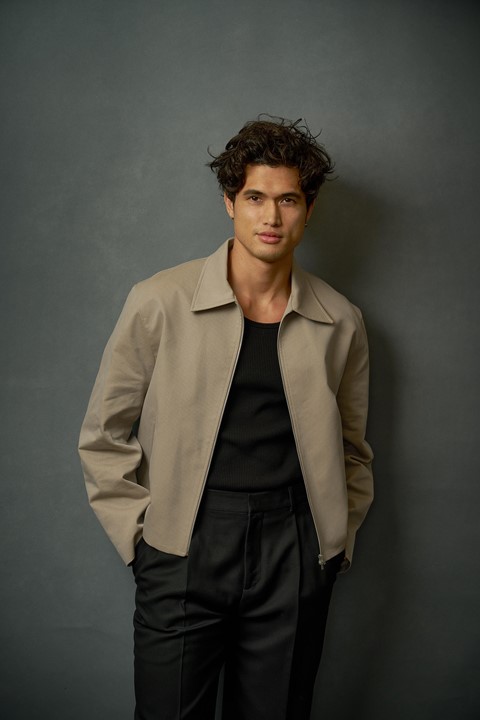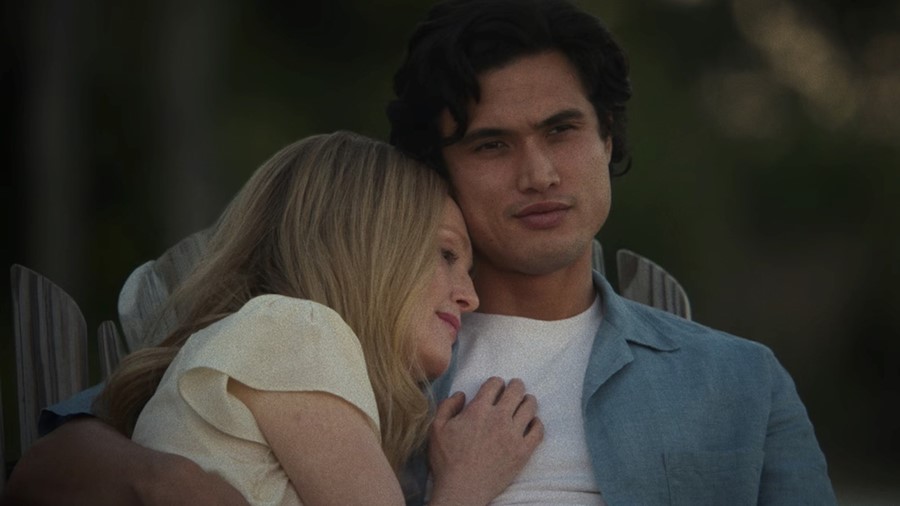The actor discusses his acclaimed role in 'May December', working with Todd Haynes, the experience of being mixed-race, and more
This article was originally published on December 19, 2023
Gratitude is the word Charles Melton identifies most with nowadays. Coming off from an almost four-and-a-half-month break during the SAG strike this year, where he spent the time building a kimchi business with his mother, Melton wasn’t expecting that anything would top the experience of working with Todd Haynes for the first time. But he has now won five awards for his performance in May December, along with an Indie Spirit Award nomination, and is surrounded by an intense amount of Oscar buzz.
Going from the final season of CW’s Riverdale to a Haynes film in the same year might be surprising to some, but the ‘teen star to Hollywood’ pipeline has given us some of our current greats, including Zendaya, Robert Pattinson, Dev Patel and Daniel Kaluuya – and Melton seems to be following the same trajectory.
In his latest role in the Haynes psychodrama May December, Melton plays Joe Yoo, a young man who must confront his past when actress Elizabeth Berry (Natalie Portman) arrives to study his wife Gracie Atherton-Yoo (Julianne Moore) for a film about their infamous relationship that began 23 years prior. The film takes inspiration from one of the most notorious scandals of the 1990s, where Mary Kay Letourneau, an American elementary school teacher, was jailed for having assaulted her sixth-grade student, Villi Fualaau. The case quickly became exploitative tabloid fodder, which played out without a sense of caution as to how it might affect the child involved. Haynes’s film – while fictional – examines the lengths that actors and film productions alike go to in order to recreate traumatic stories, and the use of extreme method acting, no matter the cost to those involved.
We caught up with Melton last week to get his take on the film’s reception, researching his character’s inspiration and working with Haynes.
Was it at all nerve-wracking coming out of hibernation after the strike to so much discourse, acclaim, and even a different kind of fame?
Charles Melton: I wouldn’t say nerve-racking. I have so many loved ones in my life that I trust, and I love filmmakers that are dear friends to me, like Todd Haynes, who I trust dearly. They really encourage me and empower me. You know there’s that saying, ‘If you live by someone’s words, you’ll die by them,’ right? So, for every good thing you hear or believe, maybe you’ll believe the bad things too. So it’s best to focus on the work, accept everything with gratitude and stay close to loved ones.
How did you come to land this role? Do you often find yourself offered ‘meatier roles’, so to speak, or was it a mindful choice to seek them out in order to change pace?
Charles Melton: As an actor, you’re always dreaming of whatever the next opportunity is, and when I was given the script for May December, I was so excited. Laura Rosenthal, the casting director, sent it to my team, and I just felt this innate connection to Joe and this desire to really disappear. I felt a connection to his repression and his loneliness, and that led to a six-week process of self-taping, working with coaches and going to places I always hoped I could go to as an actor, both physically and emotionally.
May December takes inspiration from Vili Fualaau’s life story. Did you keep him in mind when researching for the role?
Charles Melton: That’s the interesting part about Samy Burch’s script, where there are so many different topics of discussion at hand and the way she wrote these complex characters. It’s the same for the way Todd tells this story. We can take so much from it, both fiction and reality. The sources I took from specifically were movies, so I watched Ingmar Bergman’s Persona (1966), Heath Ledger’s performance in Brokeback Mountain (2005) and Tony Leung’s performance in Wong Kar-wai’s In the Mood for Love (2000). I also wanted to focus on the psychology of repression and how certain traumas can live within your body and how that would impact your physicality.
What helped you when it came to grounding yourself in the character?
Charles Melton: This is going to sound so cliché or actor-y, but I come to my characters with no sense of judgement and a lot of empathy. If there’s a chance you can draw a certain parallel to your own humanity to the character, then that’s great. I found a parallel to Joe’s experience at 13, and while it wasn’t entirely the same, we both had a sense of responsibility at a young age.
My dad was in the army for 26 years or so, and when I was 11, we lived in Germany with my mom and my two younger sisters. My dad, who’s pretty much my hero, sat me down and gave me an inspirational speech about being a good person and taking care of our family because he was about to go away to war for a year. That’s a lot of responsibility for a kid to take on, but any kid would be excited to put on those big shoes at that moment, knowing they’ll eventually grow into them. Looking back at that moment in my life, I can see that it opened an exploration into who Joe was.
“I also wanted to focus on the psychology of repression and how certain traumas can live within your body and how that would impact your physicality” – Charles Melton
Joe is a very isolated character, not just within his house but also within his town, being the only mixed Korean, as he points out. Was that feeling of isolation and lack of representation something that you related to, being half-Korean yourself?
Charles Melton: That’s a great question, and I haven’t been asked that yet. Joe doesn’t quite know his own identity, and what I found similar is that when you’re half of something, you don’t ever really feel whole. My mom’s Korean, which makes me first generation, and my dad is white American. With being ‘other’ or outside of the norm, there’s a sense of loneliness, and it’s such a universal feeling with being a third-culture kid or experiencing moving from one city to another.
Something that struck me whilst watching the film is the way that you carry yourself. It’s like a young boy playing dress up in adult clothing. As you went from Riverdale, where you played a more confident teenager, how did you shed the role you were used to, not just physically but emotionally?
Charles Melton: It was so exciting. I learned so much from my character on Riverdale and the different parts and roles I’ve played. I believe with Joe’s physicality, there’s more emotional complexity, and it’s shown through his body language. Sometimes, the body thinks before the mind does, and it moves before the mind can think. I could tell you, for example, that I hate this crowded party I’m at, or I could show you by hunching my shoulders, poking my neck out and having a pathos on my face that shows sadness or uncertainty — you can fill in the blanks that way.

That idea of the body speaking before the mind can think comes into play with the film’s emotional climax, where Joe confronts Gracie with a small voice and hunched shoulders. How was it preparing for that scene with Julianne?
Charles Melton: When you have someone like Todd Haynes directing you and encouraging you to lean into your instincts every step of the way, as well as having Julie as your scene partner, it couldn’t feel safer. I remember that you could hear a pin drop that day. That’s how sacred it felt on set that day, if not every day. It’s such a heavy scene because Joe is acknowledging a question that we, the audience, are probably asking ourselves throughout – what if he was too young to make those decisions? In a way, he’s emotionally constipated, there’s so much confusion, he’s fearful, but he’s also speaking up for himself for the first time.
One of my favourite scenes was the rooftop scene where Joe and his son were bonding for what seemed like the first time in a long time. In a way, his relationship with his children is more brotherly because of the family dynamics and his age. Was it similar behind the scenes with the younger actors like Elizabeth Yu, Gabriel Chung and Piper Curda?
Charles Melton: I wouldn’t say [his relationship with his children is] brotherly. I’d say Joe’s more of a ‘friend dad’. When [the younger actors] came down to Savannah to film, I invited them over, and we’d order pizza, eat ice cream, have movie nights, they’d do laundry at my house, we’d paint whenever we had free time. And I’d like to think I’d do these things naturally even if I wasn’t playing their father, but you know, the things we did really informed my choices when it came to filming together.
With the film being shot in just under a month, what was the process like for you during that period? Did you have any difficulty shaking Joe off at the end of the day, or did the character leave once it was over?
Charles Melton: Oh no, when we finished, we finished, you know? But 23 days is a testament to who Todd Haynes is as a director. He’s my favourite director. He’s brilliant and had a vision that came to life during the 23 days where every minute and second mattered and counted. And to have Natalie and Julie there too… it was just the trifecta of excellence.
Do you have a favourite Todd Haynes film?
Charles Melton: That’s such a hard question. There’s Safe (1995) and I’m Not There (2007), but Velvet Goldmine (1998) is probably my favourite out of all of his films.
Joe couldn’t see himself living a life beyond Gracie. Where would you want to see him?
Charles Melton: He’s on vacation somewhere, taking a little sabbatical.
May December is available on Sky Cinema from 8 December.




